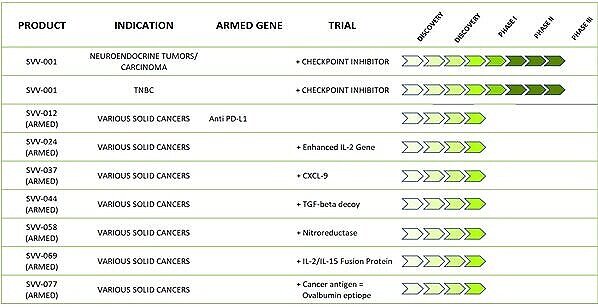OUR SCIENCE
Seneca’s lead asset is SVV, an oncolytic virus of the genus Seneca in the Picornaviridae family that is characterized by its ability to replicate selectively in certain human tumor cells (SVV-permissive cells), namely those that express TEM 8, the receptor of SVV. SVV-001 is non pathogenic in humans and animals.
SVV-001 and the Seneca genus was originally discovered in 2001 at Novartis Pharmaceuticals by Dr. Paul Hallenbeck and further developed as a novel cancer therapeutic at Neotropix, Inc. SVV has been extensively tested in over 30 non-clinical cancer models, including immunotherapeutic settings, and in three clinical trials for various solid cancer namely neuroendocrine tumors such as carcinoid, small cell lung cancer and a variety of pediatric cancers. These trials confirmed the safety of intravenous dosing of SVV-001 and safety along with suggesting significant clinical benefit.
Combining these data and the inherent properties of this viral agent, the product/platform can be utilized as an intravenously or intratumorally administered oncolytic virus to treat SVV-permissive cancers. It is estimated that over 60 percent of all solid cancers has TEM 8 expressed on the surface of tumor cells. SVV kills tumor cells through replication in such cells resulting in apoptosis and cell lysis that in turn activates an anti-tumor response.
In addition, there is a high probability of synergistic anti-tumor activity when SVV is combined with immune modulators, cytokines and checkpoint inhibitors.
THE PIPELINE
SVV is unique amongst members of the Picornaviradae family in that transgenes can be inserted into the SVV-001 genome and expressed specifically within the tumor. Transgenes can code for proteins to add additional safety over non-specific treatments and therapeutic benefit. Transgenes coding for immune-modulatory elements to further enhance the anti-cancer immune response as well as transgenes that code for proteins that eliminate negatively modulate elements within the tumor that suppress the anti-tumor response. Versions of SVV-001 are also being constructed to encode tumor antigens.



